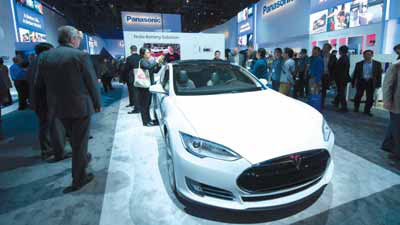Tesla attempts to steer China toward awarding it incentives
US electric carmaker Tesla Motors Inc appealed to China to extend to it incentives for new-energy vehicles, as it hopes to reap sales in China.
"We understand we don't qualify for direct subsidies (in China)," Diarmuid O'Connell, Tesla's vice-president of business development, told Bloomberg on Monday. "We're hoping the government will consider the role Tesla can have in catalyzing electric vehicle adoption in China and extend those incentives to Model S as well."
China's Ministry of Finance was unavailable for comment on Tuesday.
But on Saturday, the ministry released information that the subsidies would be trimmed less than had been expected.
Tesla's shares surged 5.4 percent to close at $196.56 on Monday, surpassing the previous record of $193.37 on Sept 30, according to Bloomberg statistics.
The Chinese government currently provides subsidies only to locally produced new-energy vehicles, with 35,000 yuan ($5,700) to 60,000 yuan per vehicle going to owners of pure electric passenger vehicles.
Last year, the government offered subsidies totaling 26.5 billion yuan to stimulate purchases of energy-efficient products, mainly automobiles and household appliances.
In 2012, China set an ambitious annual target of producing and selling 500,000 energy-efficient and alternative-fuel vehicles by 2015, with 5 million green vehicles by 2020.
The blueprint is expected to help achieve an annual production capacity of 2 million pure electric and plug-in hybrid vehicles by 2020, the plan said.
In November, it issued a new round of subsidies for alternative-fuel vehicles in more than two dozen cities and urban clusters by 2015.
Although the incentives were extended until Dec 31, 2015, they will decline by 5 percent in 2014 based on the 2013 standard, and fall by another 10 percent in 2015 from the 2013 figure.
But according to Xinhua News Agency, the cuts were only half the reduction in subsidy that had previously been announced.
In another piece of good news for its investors, on Jan 22, Tesla announced the pricing of its Model S in China: 734,000 yuan, far lower than the market anticipation of at least 1 million yuan.
The price is still about 50 percent higher than is charged in the United States but it is because it covers shipping, taxes and import duties, with "no additional profits", the company said.
Accepting orders with deposits from August will kick off sales next month in the world's largest automobile market.
Elon Musk, Tesla's billionaire chief executive officer, said in an earlier interview that the company expects sales in China to match its US volume by 2015.
In 2013, Tesla sold 22,300 Model S vehicles around the globe, far more than its initial target of 20,000 units.
Jerome Guillen, Tesla's vice-president for sales and service, told China Daily in January that the company hoped to double its annual sales in 2014 "with high expectation for the China market".
"Although not eligible for central government's subsidies now, we hope to acquire local non-financial support such as free license plate applications in big cities and favorable parking measures to make the car more attractive to potential owners," he said then.
Following the US brand's opening a Beijing showroom in November, Tesla planned to also open a service center in the city.
The electric car leader said it also was looking for sites in Shanghai, Shenzhen and other cities.
Guillen added that to support the expected high demand in China, Tesla would increase capacity.
The Nasdaq-listed innovative company now has only the Model S four-door sport car available. But, Guillen said, "we will launch Model X, a sport-utility model, at the end of this year, and in three years' time, the third generation, a smaller car than Model S, will hit the market at half the price, which we believe will have good sales in China."
lifangfang@chinadaily.com.cn
|
Tesla Motors Inc displaying its latest electric car at a consumer electronics show in Las Vegas. The US automaker is expanding into the Chinese market as the government encourages the use of new-energy vehicles. Yang Lei / Xinhua |



















